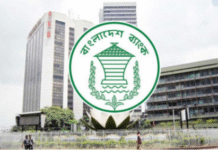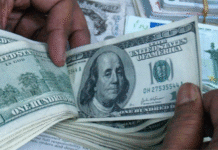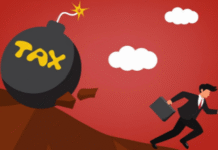
A file photo shows a man using an electronic cash register machine at a shop in Dhaka. The National Board of Revenue has dropped its plan of providing ECR to shopkeepers citing complexities in maintenance and after-sales service. — New Age photo
National Board of Revenue has dropped its plan of providing electronic cash register to shopkeepers citing complexities in maintenance and after-sales service.
Initially, the revenue board had decided to procure 10,000 ECR machines and distribute those among traders at subsidised rate as the part of implementation of the automated VAT system under the new VAT law.
Now, the tax authorities have decided to introduce a more sophisticated electronic fiscal management system under which customised electronic fiscal device or EFD will be installed at shops.
The device will print VAT invoice containing a unique authorisation code to be automatically generated by the central server of the NBR as proof of VAT payment.
Officials of VAT Online Project of NBR said that the finance minister had already approved a summary of NBR on introducing the system discarding the previous plan.
VOP is now preparing the specifications for the device, they informed.
Soon, VOP would float tender for development of the software and invitation for enlistment of interested traders to import the device, they added.
An NBR high official said that they dropped the plan of procuring ECR following delay in the implementation of the new VAT and Supplementary Duty Act-2012 which was supposed to come into force from July this year and the possible complexities related to maintenance and after-sales service.
In mid-2016, NBR hurriedly decided to provide ECR to some selected retailers and wholesalers as part of implementation of the 2012 VAT law, he said.
Now the government deferred the law until July 2019, he said, adding that it would also not be possible for the tax authorities to provide after-sales service for the distributed ECR.
Syed Mushfequr Rahman, VOP deputy director, told New Age that the software for the system would be developed locally.
Enlisted importers would import the device duty-free and traders would buy those from the importers, he said.
The device would be connected online with the NBR server, in a way bank’s credit card works, before printing an invoice for buyers and the server would send a code to the device which would appear on the printed invoice, he detailed.
A customer will be able to know whether the VAT amount he or she paid to the shopkeepers will go to the government exchequer based on the presence or absence of the code on the invoice.
If the invoice doesn’t contain the code, it will mean that the shopkeeper will not deposit the VAT to the treasury.
Mushfeq said that no shopkeepers would be able to generate the code in any way. Customers will also be able to check the authenticity of the code visiting the related website.
The tax authorities will also get alert message from the system if any shopkeeper keeps the device disconnected from the NBR server.
Officials pointed out that the main risk of the system was that there could be a possible nexus between shopkeepers and clients. Customers may avoid receiving invoice from the system to escape payment of VAT.
The revenue board would arrange lottery every two months to encourage customers to receive invoice from the system, they said.
NBR in 2009 made installation of ECR at shops in 11 categories including hotels, restaurants, sweetmeat shops, departmental and general stores, jewellery, all shops at shopping malls in metropolitan areas, and medium and large wholesale and retail shops across the country.
Source: New Age









